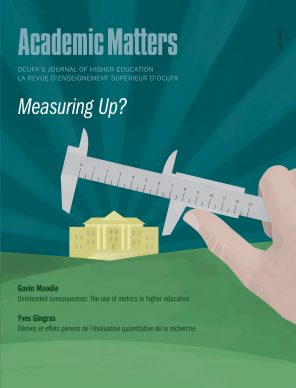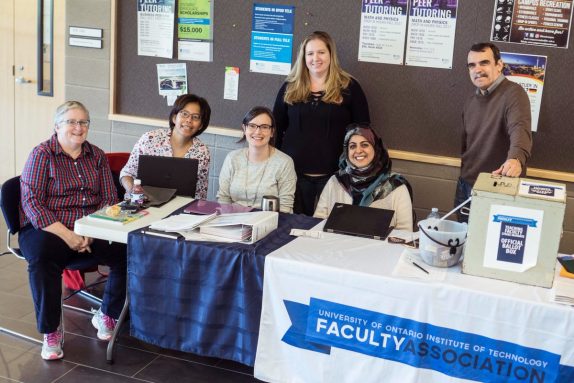
On Saturday, October 21 and Sunday, October 22, OCUFA held its first Board of Directors meeting of the 2017-18 academic year, and the first with Gyllian Phillips as OCUFA President. The weekend oriented new board members to OCUFA and allowed members to discuss developments in Ontario postsecondary education system and the organization’s revised priorities for the academic year: Good jobs/vibrant universities, university funding, and capacity building. During a special lunchtime reception on the Saturday, board members and colleagues celebrated the winners of the OCUFA Teaching and Academic Librarianship Awards.
Priorities
In the lead-up to the 2018 Ontario provincial election, it was agreed that the year’s priorities should be strategically aligned to focus OCUFA’s energies on issues most likely to gain traction with the public and political parties. In addition to good jobs/vibrant universities and university funding, capacity building was identified as an important means through which OCUFA can support the work of local faculty associations. Although not listed as priorities for the year, all members agreed that university governance and equity remain important issues and should continue to permeate OCUFA’s work.
Priority: Good jobs/vibrant universities
One of OCUFA’s established long-term goals is a postsecondary education system where every academic job is a good job with fair compensation, reasonable workloads, access to benefits, and job security. The good jobs priority makes the connection between the importance of good jobs and their essential role in fostering vibrant and dynamic universities. This year, OCUFA will focus on three opportunities for improving the terms and conditions of employment at Ontario’s universities: fairness for contract faculty, faculty renewal, and pensions.
Fairness for contract faculty
In recent years, substantial progress has been made raising awareness about the challenges faced by contract faculty at Ontario universities. Through the ongoing legislative process for Bill 148, OCUFA has kept fairness for contract faculty on the agenda, advocating for amendments to the legislation to improve conditions for academic workers in precarious jobs. Faculty voices have been prominent in the debate and OCUFA will continue to support member associations through the Contract Faculty and Faculty Complement Committee and special contract faculty focused issues of OCUFA Report. OCUFA is also continuing to work closely with solidarity partners, including the Fight for $15 & Fairness, who hosted a provincial campus assembly in September, and the Canadian Association of University Teachers, who hosted the Contract Academic Staff Conference in October, and with whom OCUFA helps organize the annual Fair Employment Week each fall.
Faculty renewal
Full‐time faculty hiring has fallen dramatically behind growth in student enrolment in the past decade. This means fewer faculty are available to carry out the core research and teaching functions of the university. Recently, the Ontario government has shown an interest in this issue and OCUFA will work hard to keep the need for faculty renewal on the agenda, both provincially and on individual university campuses.
Pensions
OCUFA has worked with sector stakeholders for several years on an initiative to build a new voluntary jointly sponsored pension plan (JSPP) in the university sector. This initiative is intended to provide a secure and sustainable pension option for interested university faculty associations and staff unions in the province. As the pension environment shifts, OCUFA will continue to organize workshops and meetings to help all member associations reach their pension-related goals and expand their capacity to communicate pension issues at the local level.
Priority: University funding
OCUFA has held a long-standing goal of increasing public funding for universities to support high quality postsecondary education in Ontario. Over the past several years, the provincial government has been leading a process to update and streamline the university funding formula. Of concern is the government’s intent to tie university funding to performance according to a series of metrics that have still not been sufficiently defined. It is expected that these will be negotiated in the next round of Strategic Mandate Agreements (SMAs). With no additional funding for universities in the last provincial budget, securing increased public funding for Ontario’s universities will be a key focus of OCUFA’s work in the coming months, particularly with the provincial election on the horizon.
As the new funding model is implemented along with the third round of SMAs (negotiated between MAESD and Ontario’s universities) it is vital that faculty input is meaningfully incorporated into these agreements. It is unacceptable that faculty voices were largely ignored in previous SMA negotiations. Through advocacy efforts, OCUFA will work to persuade MAESD to put in place a development process for the next round of SMAs that requires faculty input and clearer timelines for negotiations.
Priority: Capacity building
Ontario’s university faculty face serious challenges in their workplaces, including too few faculty to do the work, and too many precarious jobs at underfunded universities. Many changes to Ontario’s higher education sector have shifted the collegial dynamic between faculty and their employers. In the coming year, OCUFA will focus on supporting member associations in building stronger unions and a university labour movement able to more effectively tackle these problems. This will include the continued strengthening of local bargaining through OCUFA’s Countdown to Strong program, the development of capacity building tools that can be leveraged by member associations, and more training for local leaders.
2018 provincial election
During the board meeting, board members had a chance to discuss OCUFA’s preparation for the 2018 provincial election. OCUFA’s three priority areas for the 2017-18 year will be key in efforts to put good jobs and public university funding on the agenda during the election. Additionally, the report generated by OCUFA’s 2017 Policy Exchange will help inform a comprehensive set of proposals the organization will lobby for as provincial parties develop their platforms.
Guest speakers
The board meeting featured several guest speakers. Deputy Minister of Advanced Education and Skills Development, Greg Orensak spoke about the Ministry’s upcoming priorities. Greg Lyle, President of Innovative Research Group Inc., provided an overview of the political landscape in Ontario and discussed the different scenarios that should be expected in the lead-up to the next provincial election. Finally, JP Hornick, Chair of the Ontario Public Service Employees Union’s (OPSEU’s) faculty bargaining team, updated board members on the state of negotiations between college faculty and the College Employer Council. College faculty have been bargaining for more full-time positions, fairness for contract faculty, faculty input in academic decision-making, and academic freedom. Following Hornick’s address, the OCUFA Board passed a motion in support of OPSEU’s efforts to improve working conditions for their members.
Awards celebration
Finally, a special luncheon gala celebrated the recipients of this year’s Teaching and Academic Librarianship Awards. Since 1973, these awards have recognized the exceptional contributions made by professors and librarians to the quality of higher education in Ontario.
The 2016-2017 Teaching Award recipients are:
- Dora Cavallo-Medved, a permanent lecturer in the Department of Biological Sciences at the University of Windsor
- Kimberley Dej, Associate Professor in the School of Interdisciplinary Science at McMaster University
- Milena Head, Professor of Information Systems at McMaster University
- Quazi Mehbubar Rahman, Assistant Professor in the Department of Electrical and Computer Engineering at Western University
- Mira Sucharov, Associate Professor of Political Science at Carleton University
The 2016-2017 Academic Librarianship Award recipients are:
- Karen Pillon, Head of Access Services at the Leddy Library at the University of Windsor
- Mindy Thuna, Head of the Engineering and Computer Science Library at the University of Toronto
The luncheon featured a keynote address from Paul Kennedy, host of CBC’s Ideas, who shared thoughtful and touching stories about the importance of teaching, and the role faculty had in changing the course of his life. Attendees were also shown the premiere of a new video profiling former Teaching Award winner Shafique Virani.
The next OCUFA Board of Directors meeting will be held in February.













